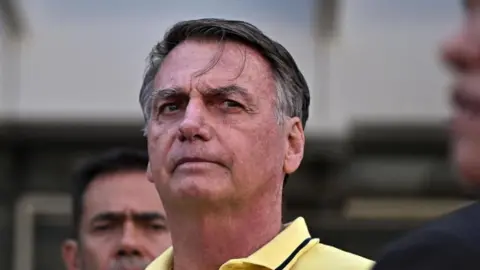The coup trial of Brazil's right-wing former President Jair Bolsonaro will enter its final stage on Tuesday.
He is accused of masterminding an attempt to stay in power after losing his bid for re-election in 2022, which culminated in his supporters breaking into and vandalising government buildings in the capital, Brasília.
A panel of five Supreme Court judges is expected to reach a verdict by 12 September.
Bolsonaro has always denied any wrongdoing and said the charges were politically motivated.
His cause has been adopted by US President Donald Trump, who has called the trial a witch-hunt, using it as justification for imposing 50% tariffs on some Brazilian goods and sanctioning the Supreme Court judge leading the proceedings.
If convicted, Bolsonaro could face more than 40 years in prison. It is expected he could be present in court for at least the first and last day of this final phase of the trial.
He and seven other defendants who worked closely with him in government face five counts, all related to attempting a coup.
Bolsonaro has been charged with leading an armed criminal organisation, attempting the violent abolition of the democratic state of law, an attempted coup, damage to federal property, and the deterioration of listed heritage. Each charge could lead to sentences of multiple years.
The allegations date back to before his supporters stormed government buildings on 8 January 2023.
Following an extensive investigation, police alleged that he and other officials had been planning acts to abolish the democratic rule of law and keep him in power as early as 2019.
Police say he had full knowledge of a plan to assassinate Luiz Inácio Lula da Silva - who at the time was the president-elect - among others.
Investigators cited a dialogue captured between the alleged conspirators and meetings at the presidential residence that support the charges.
Bolsonaro's trial, featuring multiple defendants and substantial political implications, is a major event in Brazil's recent political history, reflecting ongoing tensions in the country following his presidency.
}




















